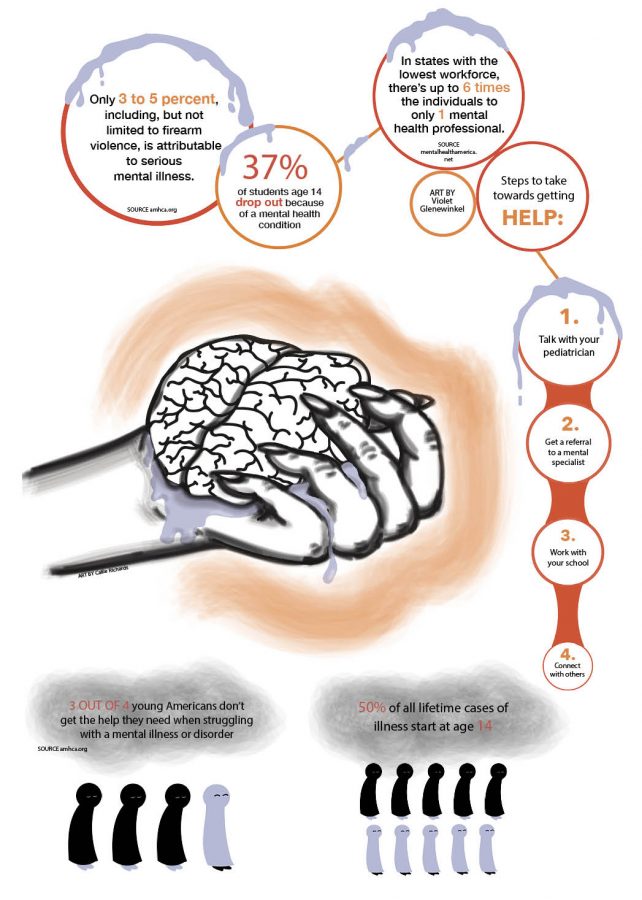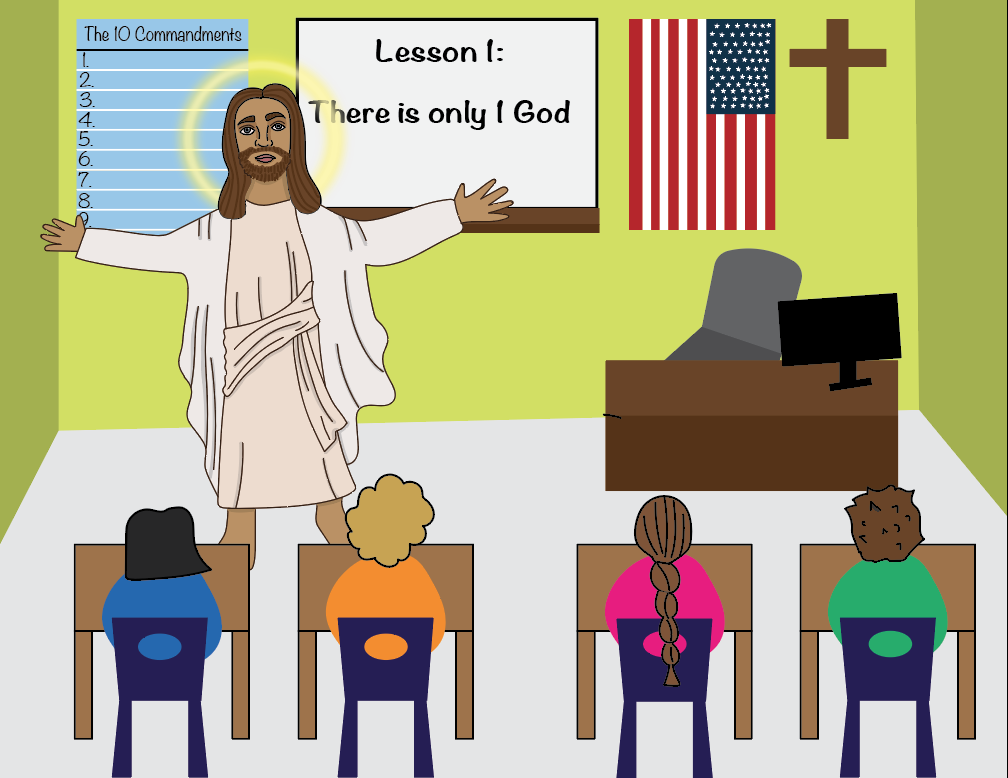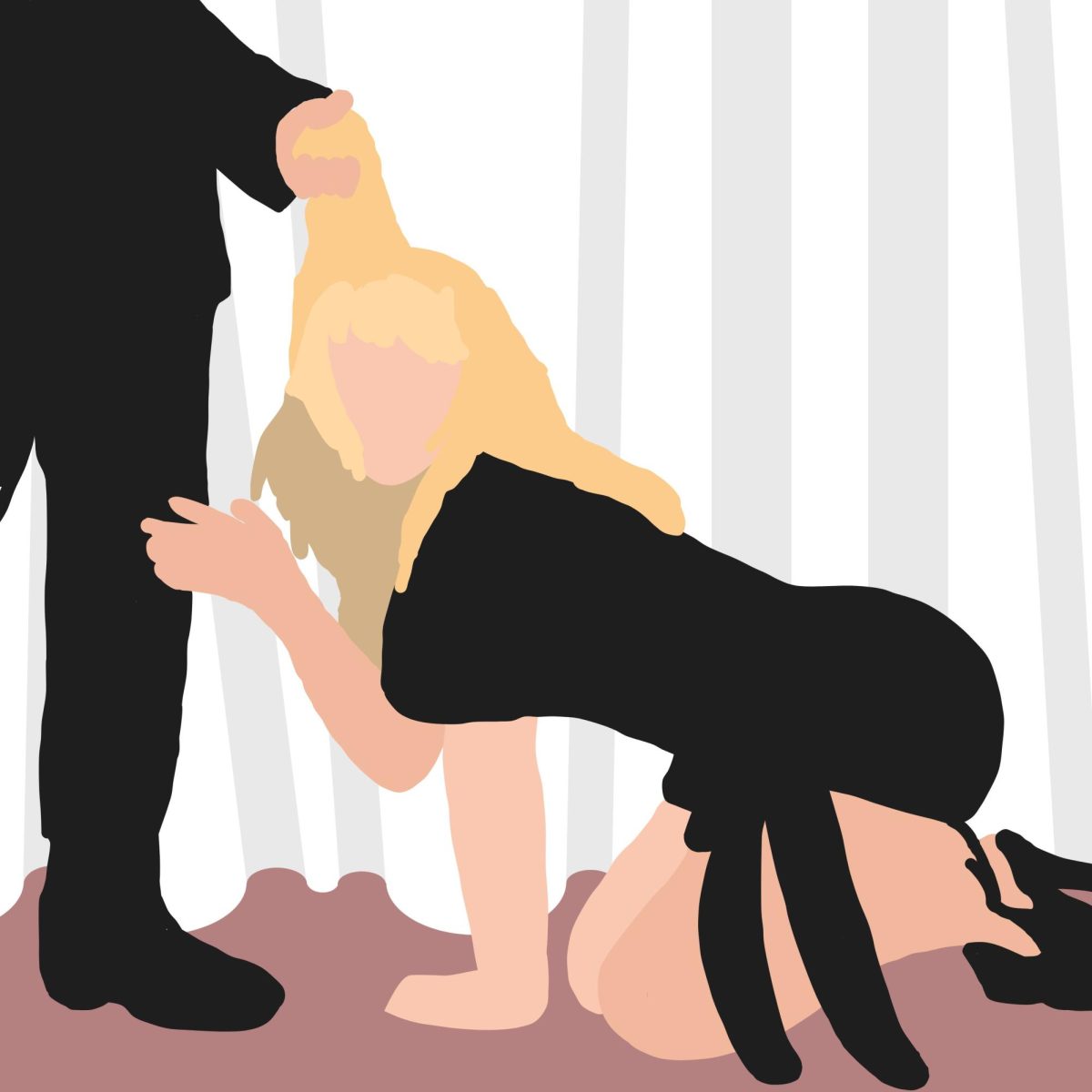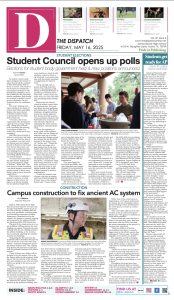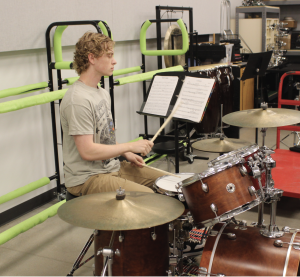The Mental Stigma
April 28, 2018
The tragedy of the Marjory Stoneman Douglas High School shooting in Parkland, Florida resulted in seventeen innocent lives lost, creating a shock that has affected lives across the nation.
As hearts and minds cope with the loss across the country, questions have risen on the subject of the role mental illness plays in both the perpetrator and victim.
“I think it’s difficult to explain why anyone in the world could create such terror on other human beings,” academic dean Susan Leos said.
A rise in advocacy as well as the overwhelming impact the shooting has had on young adults is what has caused the tragic event to stand out apart from others.
“Part of the reason why this has impacted people is because this is a group of students who are very literate and knowledgeable and speaking up about what they have had happen to them,” Leos said. “Now students are speaking up more about the ones who have lost their lives in this tragedy.”
Concern surrounding the well-being and safety of students particularly at Bowie has been a constant worry since the tragedy.
“I have received several emails and communications from students, teachers, and parents, with suggestions for changes at Bowie and action to contribute to the larger, regional and national conversation about preventing events like this,” principal Mark Robinson said. “We need everyone’s advocacy and involvement to support common sense programs and legislation.”
While some would jump to pure evil being to blame for the violence, Leos sees a lack of help and care as more of the issue.
“What I see more than anything is our society and our country in coming to terms with mental and emotional illness,” Leos said. “We don’t have enough support for the people who suffer from emotional turmoil and mental illness, diagnosed or undiagnosed.”
The surrounding stereotypes of mental illness has separated it from society and only recently, has it begun to surface as a prevalent issue with the hope of shedding those unjust generalities.
“We tend to hide from [mental illness] or not admit it because of the stigma that comes with the label,” Robinson said. “We need to support mental health programs and wellness.”
Even though there have been instances of violence committed by people who are mentally ill does not mean all mentally ill people are the ones doing the violence.
“Mentally ill people are statistically more likely to be the victims of violence rather than the perpetrators of violence,” senior Avila Dye said.
With rumors of the Parkland shooting gunman being mentally ill has caused a rise of suspicion around innocents who suffer from similar illnesses.
“Every time a horrific instance of gun violence occurs I see a spike in really concerning rhetoric about mental illness from people who I otherwise generally agree with when it comes to gun control,” Dye said.
Therefore, there is a natural line of division formed on beliefs involving mental illness when a tragic event occurs.
“When our nation is faced with tragedy, there’s a side that wants to help these people and the other side is turning against this whole group of people,” Leos said. “That’s the nature of the definition of prejudice.”
Rather than pointing fingers at the ill, Dye believes there should be more measures taken towards reevaluating gun violence and the weaponry culture in the nation.
“I think that we as a country need to take a hard look at our culture surrounding guns and violence, from lax gun laws to police brutality to glorification of war, rather than scapegoating vulnerable people,” Dye said.
There is no particular “profile” that is said to prove or predict future violence from an individual, but rather there could be signs.
“A variety of behaviors could be concerning depending on the individual,” Robinson said. “Violent fantasy content, anger problems, suicidal/homicidal ideation, cruelty to animals, inappropriate affect, anhedonia, or violence and cruelty.”
While the surveillance of mentally ill students may seem harmless, the possibility of their situation taking a downward turn towards an incident than one of a more positive nature is becoming a rising concern.
“It really worries me that there have been lots of high-profile calls for things like increased surveillance of mentally ill students,” Dye said. “I can’t see something like that going anywhere other than scapegoating and unwarranted suspicion or even violence being directed towards people who are already vulnerable.”
On the other hand, violence like the Parkland shooting has raised awareness towards getting students the help they need.
“Parents or teachers are being more cautious of paying attention to their kids and students being cautious towards students to getting them the help they need,” Leos said. “I think there has been a shift in our nation that it is something shameful that you don’t talk about it or share.”
On the other side of the country, the effects of Parkland has touched Bowie students, causing an increase in worry over safety and the future.
“We have made some changes that Robinson has made that are very visible like locking the iron gate and asking teachers to be more cautious of locking their doors,” Leos said. “The counselors are going to use all their best counseling and training to any students worried or anxious, even though the shooting happened in Florida.”
Mentally ill or not, any suspicious behavior should be reported to administration or an adult immediately.
“The priority is to keep all students safe,” Vida Clinic therapist Alex Rudy said. “Whether or not the threat seems credible, it should be addressed so that further assessment of safety can take place.”
Regardless of who makes the report, the first step is to get the campus School Resource Officers (SROs) to investigate.
“We have an anonymous hot-line where students will use it to say ‘look this kid said this to me or did this to me’ or some sort of threat,” Leos said. “We do take the information, every bit of information, and handle it the way the SRO feels would be best.”
If the report becomes something more and an actual crime has been committed, the situation is turned over to local police department rather than the SROs.
“It is important that police, who have the authority and technology to take action as trained investigators determine if a crime has been committed,” Robinson said. “If the action reported does not rise to the level of a terrorist threat, it is turned over to school administration for campus discipline and/or counseling support.”
At Bowie, counseling and therapy begins with an evaluation of the student’s history and personality as well as creating goals for getting better to move towards becoming mentally healthy again.
“The most important part of counseling is the ability of the individual to be able to trust and open up to the counselor about difficult situations they are currently experiencing,” Rudy said. “Together, they can reflect on what is causing the most stress in their lives and develop skills to best cope with those stressors.”
According to Leos, there are still milestones to go before communities as well as the nation understands the complexity and needed help young adults need in situations of disorder or illness.
“It’s good that more students and parents are talking about it, but it’s still going to take time and more education to understand,” Leos said.
As people begin to understand what mental illness entails as well as recognizing the individuals who have the illnesses, the less negative stigma there will be surrounding it.
“What I see is the more our parents, students, all of us in our world, can actually be able to name something and understand it and see it from a human point of view, the better off we are with coping with the situation,” Leos said.


